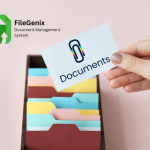In modern business, which is greatly influenced by rapid information and technology, an enterprise finds a significant impact of information management.
Speedy access, proper organization, and full security of documents potentially influence productivity, decision-making, and overall success.
However, the transition away from paper-based procedures in time-consuming, inaccurate, and difficult-to-manage arrangements is farfetched by many enterprises.
DMS is an omnipotent tool that changes the way of doing business with respect to documents. In this blog, we will talk about Document Management Systems and their significance for any business in today’s world.
We will be discussing how a DMS-for example, FileGenix can respond to commonly faced challenges and redefine your document management practices.
Understanding Document Management Systems (DMS)
A DMS is a digital way to store, manage and track documents digitally. It acts as a central repository through which documents can be easily accessed and shared and gets organized.
This would help in managing the document life cycle, that relates to document creation / document upload, review, follow-up, and eventually, disposal.
It usually contains many features such as versioning, document indexing, search, access control, and storage for security. Document management done this way ensures that the exercise of document management is productive.
The major reason for adaptation of DMS is to eliminate in-efficiency and associated risks related to paper processes.
A DMS can digitize documents and automate associated workflows, therefore enabling an organization to manage its documents comprehensively. From the need for less physical storage, fewer chances of errors, to more collaboration among teams.
The Problems with Paper-Based Processes
Before discussing the benefits of DMS, it would be appropriate to indicate those more general difficulties that businesses face when working in traditional ways using paper documents.
Although paper has been used for centuries as a medium, it carries some serious drawbacks in the context of contemporary business:
-
Tedious to Find a Particular Document:
It is very tedious to find a particular document in a heap of papers or amongst file cabinets.
The employees waste much valuable time in order to scan through the papers, which also leads to a delay in decision-making and efficiency.
-
Poor Accessibility:
Physical documents pin a single sheet of paper to a place. Teams mostly find it hard to access the information needed while working remotely or from different locations.
The poor accessibility fosters a poor collaboration environment; therefore, slowing business operations down in the long run.
-
Storage Space and Costs:
A large amount of paper documents requires huge space for their storage. This often becomes very expensive to the concerned companies, particularly when they come within expensive cities.
With each passing moment or with an increase in time, increased documentation leads to a greater demand for increased storage requirements, this enhances operational costs.
-
Loss or Damage:
Paper documents are bound to be destroyed due to environmental elements-fire, water, and infestation by pests.
The paper based documents might get lost or misplaced, and thus vital information may get irretrievably lost with attendant legal or regulatory consequences.
-
Insecurity to Maintain:
Security for sensitive information maintained on paper is hard. This includes unauthorized access, theft, or tampering with physical documents comprising data security with breaches and compliance issues.
-
Lack of Efficient Collaboration:
Most collaborations on paper documents involve making multiple copies, marking up changes manually, then reconciling these changes—a very non-efficient process prone to errors and miscommunication.
-
Environmental Impact:
The paperwork contributes to environmental degradation both in its production and managing the waste. Businesses that depend so much on the use of paper are incurring not just greater cost but also leaving a higher carbon footprint.
How a Document Management System (DMS) Solves These Problems
A DMS like FileGenix addresses this issue by offering an end-to-end, digital solution to manage your documents. How a DMS would revolutionize your business operations is described below:
Increased Efficiency and Productivity:
FileGenix ensures that there is one digital repository for all documents. Heaps of paperwork get converted into traceable, accessible, and searchable documents.
The required information is available right in front of employees within a few clicks rather than conventionally wasting hours in retrieving and managing those documents.
Automated workflows ensure that the documents flow through the required approval processes on time with no bottlenecks, hence further improving productivity.
Access Anywhere, Any Time:
One of the major advantages a DMS can offer is the ability to access documents anywhere and at any time.
Since FileGenix is cloud-based, that may ease the process for remote teams or employees operating from scattered locations to access and work on those documents in real time.
In fact, this is one of the basic levels of accessibility that needs to be accounted for nowadays, as business is more or less becoming really remote and globalized.
Reduced cost of storage:
Digitization of documents means businesses can get rid of physical storage. FileGenix offers secure, cloud-based storage for all documents at much lower costs than the cost of physical storage regarding office space rent, utilities, and maintenance.
Improved Security and Compliance:
Advanced security features, including access controls have been integrated into the FileGenix system for added protection against sensitive information.
As a result, unauthorized document exposure or alteration would reduce data breaches because only authorized personnel can access or modify documents.
Smooth Collaboration:
FileGenix enables several users to access one document and perform work collaboratively on it, without the need for various copies of the same document to be made, or have documents manually reconciled afterward.
Version control ensures all are working on the most current version of the document to minimize errors and enhance collaboration.
Comments and annotations can be made directly in the system for tracking changes and communicating feedback more efficiently.
Sustainability:
Such a DMS, like FileGenix, reduces the usage of paper; hence, it is friendly to the environment.
An organization may reduce its carbon footprint to a minimum by minimizing the usage of paper, reducing waste, and following an eco-friendly approach.
Disaster Recovery:
Paper documents are more prone to getting lost or damaged by ill-fated disasters like natural calamities.
The DMS solutions, on the other hand, contain very good levels of disaster recovery. Your documents would get routine backup and could be restored very quickly, thereby minimizing business disruptions.
Why Your Business Needs FileGenix
Setting up a document management system like FileGenix is not just about keeping pace with technology, but also making your business future-proof.
Efficiency in document management gives a business the needed competitive edge in today’s world, where information has become a key asset. Offering scalability in operations, FileGenix grows with business ventures by offering flexibility to take on more documents as operations increase in size.
Besides, FileGenix has been designed keeping ease of use in mind. The intuitiveness in the interface ensures that employees adapt quite quickly with this system, reducing the learning curve, therefore enhancing the full benefits of digital document management.
Be it a small business looking for an operational workflow or a large enterprise requiring a robust document management solution. FileGenix can adapt to your requirements.
Conclusion
In view of this, the shift from paper-based systems to a digital DMS, such as FileGenix, will be a very crucial step toward the efficiency, safety, and competitiveness that the contemporary business world requires.
Benefits of DMS solution are not limited to just storage of documents but include changing how your business operates and hence making better decisions. Securing your information in an accessible and well-managed manner with DMS solutions
With the rate of digitization that is in vogue, an investment in DMS like FileGenix has become much more than a prudent choice. It has become an indispensable ingredient for long-term success.


